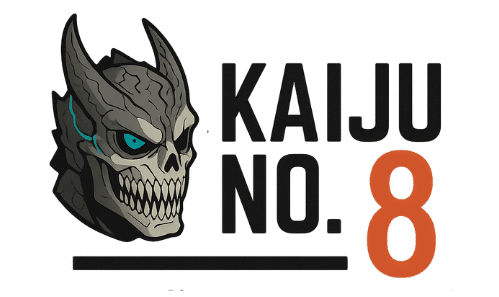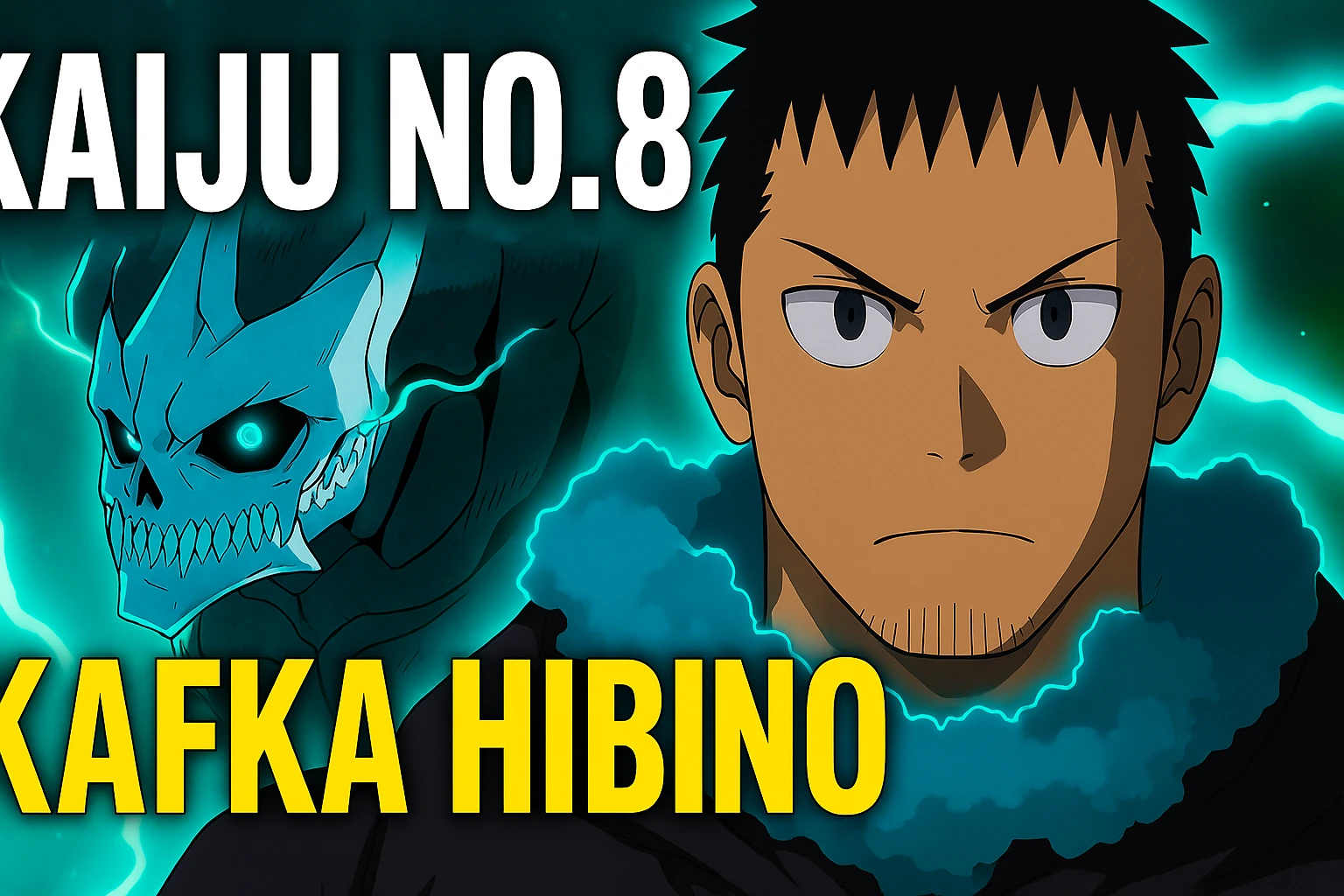Kafka Hibino is the central protagonist of the Kaiju No. 8 anime and manga series. His transformation from a kaiju clean-up worker to the powerful, unpredictable Kaiju No. 8 lies at the core of the show’s narrative. As a dual-identity character — part human, part monster — Kafka represents a unique lens through which themes of failure, redemption, and identity are explored.
This in-depth analysis explores Kafka Hibino’s backstory, motivations, relationships, kaiju transformation, powers, and his role in shaping the world of Kaiju No. 8.
Kafka’s Early Life and Broken Dreams
Kafka was once a bright, hopeful young man who promised his childhood friend, Mina Ashiro, that he would join the Defense Force and fight kaiju alongside her. However, life didn’t go as planned. Kafka repeatedly failed the Defense Force entrance exam and eventually settled into a job cleaning kaiju remains for Monster Sweeper Inc.
Now in his early 30s, Kafka is a man resigned to mediocrity. Haunted by regret and lost potential, he watches from the sidelines as Mina rises to become Captain of the Defense Force’s Third Division. This emotional distance adds personal stakes to the story, as Kafka must overcome not just physical obstacles but the psychological weight of failure.
The Turning Point: Kafka’s Transformation into Kaiju No. 8
Kafka’s life takes a drastic turn when a mysterious kaiju parasite enters his body during a hospital stay. Instead of killing him, the creature fuses with Kafka, granting him the ability to transform into a humanoid kaiju. This form is officially classified as Kaiju No. 8 by the Defense Force.
This event marks the beginning of Kafka’s second chance — a shot at redemption. But it also puts him in constant danger, as the Defense Force considers all numbered kaiju a top threat to humanity.
Kafka’s Dual Identity: Man vs. Monster
Kafka’s character is defined by his internal conflict: he wants to protect people, but he is now the very thing they fear. Unlike most protagonists in shonen anime who gain powers and are instantly celebrated, Kafka’s power makes him a target. Every battle forces him to weigh his own safety against the greater good.
This duality creates a rich, layered character who navigates:
- The fear of exposure
- The weight of guilt
- The temptation to give in to the kaiju within
- The responsibility of having the power to save others
Kafka’s dilemma resonates with audiences because it mirrors real-life struggles with identity, belonging, and self-worth.
Kafka’s Appearance in Kaiju Form
As Kaiju No. 8, Kafka’s appearance is drastically altered. His skin turns jet black with skeletal cyan lines running across his torso and limbs. His face becomes a sharp-toothed skull, and glowing energy emanates from his chest and arms. His kaiju body is lean yet monstrous, designed for speed and impact.
Notably, this form is still vaguely humanoid, symbolizing that Kafka hasn’t lost his humanity — yet. His design reflects his unique status as a kaiju who still protects rather than destroys.
Kafka’s Powers and Abilities
Kafka’s kaiju form grants him an array of offensive and defensive abilities that make him one of the most powerful entities in the series.
1. Superhuman Strength
Kafka can punch through armored kaiju exoskeletons and demolish concrete with ease. His blows often generate shockwaves powerful enough to destabilize surroundings.
2. Enhanced Speed and Reflexes
In his transformed state, Kafka moves at blinding speeds, allowing him to dodge attacks and close distances rapidly — even faster than elite Defense Force operatives.
3. High Durability
Kafka’s body can withstand heavy artillery, laser fire, and massive explosions. His resilience has allowed him to stand toe-to-toe with Kaiju No. 10 and Kaiju No. 9.
4. Regeneration
Kafka recovers from grievous injuries, including impalement and limb damage, in seconds. This makes him extremely difficult to kill.
5. Kaiju Core Detection
Kafka has an intuitive sense of where a kaiju’s core is located, allowing him to finish battles more efficiently.
Character Growth: Kafka’s Evolving Resolve
Initially, Kafka is hesitant to transform, afraid of being discovered. But as he witnesses the Defense Force struggle, his sense of duty takes over. Each battle pushes Kafka closer to accepting his dual nature.
Key growth moments include:
- Saving Kikoru Shinomiya during her first field mission
- Protecting Vice-Captain Hoshina during a base invasion
- Surrendering to the Defense Force after revealing his true form
By choosing transparency and trust, Kafka earns a chance to stay under observation instead of being executed. His bravery wins over key allies and earns the grudging respect of the top brass.
Kafka’s Relationships
Kafka’s character is further defined by his meaningful relationships, which serve as both emotional anchors and narrative drivers.
Mina Ashiro (Childhood Friend, Now Captain)
Their shared past and unspoken bond provide one of the show’s emotional cores. Mina is unaware of Kafka’s transformation at first, which creates tension and pathos in their interactions.
Reno Ichikawa (Best Friend)
Reno starts as Kafka’s junior but grows into a peer and confidant. He suspects Kafka’s secret but respects his decisions, creating a deep sense of loyalty.
Kikoru Shinomiya (Fellow Cadet)
Initially arrogant and dismissive, Kikoru softens after Kafka saves her life. She later defends him when his identity is revealed, showing her growth as well.
Gen Narumi and Soshiro Hoshina (Commanding Officers)
Narumi keeps Kafka under close watch, yet allows him to train and fight. Hoshina is more skeptical but acknowledges Kafka’s heroism. Their dynamic adds dramatic tension.
The Importance of Kafka’s Age and Life Stage
Kafka is not a typical teenage hero. At 32, he brings a different tone to the series — one of missed chances and the long road to redemption. His maturity and failures give Kaiju No. 8 an emotional depth uncommon in action anime.
Kafka is relatable to older audiences who have faced rejection, loss of purpose, or delayed success. His journey tells us that heroism isn’t about perfection — it’s about perseverance.
Kafka’s Role in the Defense Force
Once accepted under heavy restrictions, Kafka becomes a wildcard asset. His ability to transform during emergencies turns the tide in several battles. Yet he is constantly monitored, creating tension between trust and caution.
Kafka is a reminder that in a world of rigid systems, sometimes the most unconventional person is the one who saves it.
How Kafka Compares to Other Characters
Compared to powerhouses like Kikoru or Gen Narumi, Kafka is unique in that his strength is both a blessing and a curse. While others rise through ranks, Kafka walks a razor’s edge between asset and threat.
His humanity and emotional compass set him apart from traditional protagonists — he’s not the strongest by rank or strategy, but by sacrifice and resilience.
FAQs About Kafka Hibino
Is Kafka Hibino a real kaiju or human?
Kafka is a human fused with a kaiju parasite. He retains his human consciousness but can transform into a fully functional kaiju.
How did Kafka become Kaiju No. 8?
He was infected by a parasitic kaiju while in the hospital, which gave him the ability to transform.
Why is Kafka considered dangerous?
As Kaiju No. 8, he possesses enough power to destroy cities and elite Defense Force operatives. This makes him a potential threat, even if he means well.
Does Kafka ever lose control of his kaiju form?
So far, Kafka retains full mental control during transformations. However, hints suggest that extended use may weaken this balance.
Will Kafka be executed by the Defense Force?
As of now, Kafka is allowed to live under strict monitoring. However, any violation could result in termination.
Conclusion: Kafka Hibino — The Heart of Kaiju No. 8
Kafka Hibino is more than just the title character of Kaiju No. 8. He is its emotional anchor, its symbol of second chances, and a unique hero forged from failure. His journey from janitor to Japan’s secret weapon is not just action-packed — it’s deeply human.
By portraying a protagonist who is older, broken, and uncertain, Kaiju No. 8 invites viewers to reflect on the value of persistence, the complexity of identity, and the true nature of heroism. Kafka Hibino is not the perfect soldier — but he might be the perfect hero for a world on the brink of destruction.

